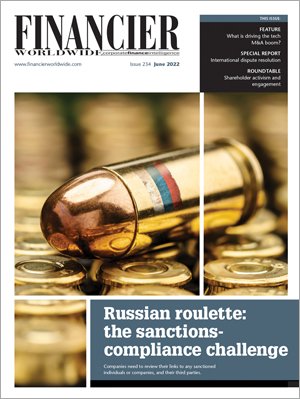The challenge of climate change disputes
June 2022 | FEATURE | LITIGATION & DISPUTE RESOLUTION
Financier Worldwide Magazine
For companies, the prospect of becoming involved in a climate change-related dispute is no longer a niche academic argument. As courts continue to expand their role in facilitating regulatory change, companies, governments and industries are now facing unexpected judgments with serious implications for business operations.
Propelled by a growing sense of global urgency to tackle climate change, in recent years there has been a dramatic rise in the number of climate change-related legal claims, including both litigation and arbitration, being brought globally. A significant portion have been brought against governments, both for the actions they have taken to mitigate climate change and for not taking enough action.
According to the Climate Change Laws of the World (CCLW) database of climate litigation cases in over 40 countries, which is maintained by the Grantham Research Institute on Climate Change and the Environment at the London School of Economics and Political Science, there were 1842 cases of climate change litigation brought globally between 1986 and 31 May 2021. Of these, most cases (1389) were brought in the US.
The CCLW data also shows that climate change litigation is a growing phenomenon. Between 2015 and 2021, the number of cumulative cases more than doubled around the world, with approximately 1000 cases brought between 2015 and 31 May 2021, compared to approximately 850 cases brought over the preceding 29 years, from 1986 to 2014.
Historically, climate change litigation has been dominated by claims against companies involved in the extraction, refinement and sale of fossil fuels. Major emitters, particularly oil & gas companies, have attracted most complaints. Arguments typically assert that the activities of these companies directly relate to emissions associated with climate change.
But claimants are now targeting a broader range of private sector and financial actors, with the grounds for claims widening to focus on fiduciary duties and corporate governance. There is a growing number of cases being brought or threatened against directors, financiers, insurers and others, as an alternative means of blocking particular activities. There has also been a rise in companies accused of ‘greenwashing’, the practice of misleading stakeholders by overstating environmental performance or advertised benefits.
Going forward, climate change disputes will pose challenges for companies across a wide range of industries. Financial institutions, for example, can expect continued legal and regulatory risks associated with climate change and sustainability. The transition to a net zero global economy will require input from a variety of actors. This alone makes it likely that litigation will be brought against a more diverse range of corporate defendants. With climate change becoming an ever more pressing item on government and corporate agendas, businesses need to understand and take steps to mitigate related litigation risks in the future.
“With climate change becoming an ever more pressing item on government and corporate agendas, businesses need to understand and take steps to mitigate related litigation risks in the future.”
One challenge companies face when addressing climate change disputes is that there is no single definition. In 2019, the International Chamber of Commerce (ICC) Commission Report ‘Resolving Climate Change Related Disputes through Arbitration and ADR’ took a broad view, characterising them as “any dispute arising out of or in relation to the effect of climate change and climate change policy, the United Nations Framework Convention on Climate Change (UNFCCC) and the Paris Agreement”. While organisations may also consider concerns around ‘sustainability’, this term is equally subjective and lacks defined parameters.
As knowledge and understanding of the climate challenge facing the planet increases, the number of claims against governments and major emitters that fail to adopt serious long-term strategies, underpinned by concrete plans to meet reduction targets, will also increase. But meeting those targets will not be cheap.
Indeed, according to a recent report by the International Energy Agency (IEA), to reach net zero emissions by 2050, the cost of annual clean energy investment worldwide will need to more than triple by 2030 to approximately $4 trillion, and will require the deployment of clean energy technologies such as renewables, electric vehicles and energy efficient building retrofits. And that is just the energy space. Other industries will require mammoth levels of investment too. As new technologies and processes are deployed to fight climate change, the scope for novel disputes also expands.
Given the rise in climate change-related litigation, it is important for directors to examine the environmental impact of their business activities to assess personal risk. There are a wide range of potential claims that may be brought against directors. Regulatory action is increasing liability risks for directors and officers around the world.
In the UK, regulators have already made climate-related financial disclosures mandatory, with new requirements being introduced in 2022 and planned for 2025. In the US, in March 2022 the Securities and Exchange Commission (SEC) voted in favour of proposing new rules requiring public companies to disclose their greenhouse gas emissions, climate-related financial impact and expenditure metrics, and the effect of climate change on their business.
Climate change disputes are complex, not least because they exist in a state of flux. Climate-related policy and regulation, both nationally and internationally, continue to evolve. At the same time, increasingly innovative claims are being asserted against corporates. In light of these developments, climate risk assessment and mitigation efforts should be an ongoing effort.
© Financier Worldwide
BY
Richard Summerfield


